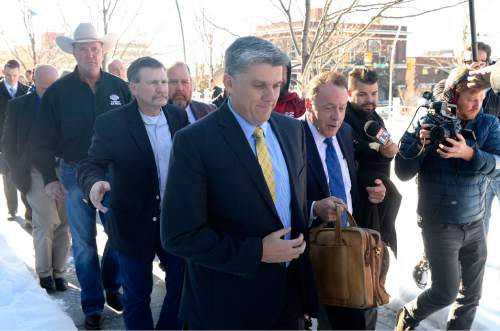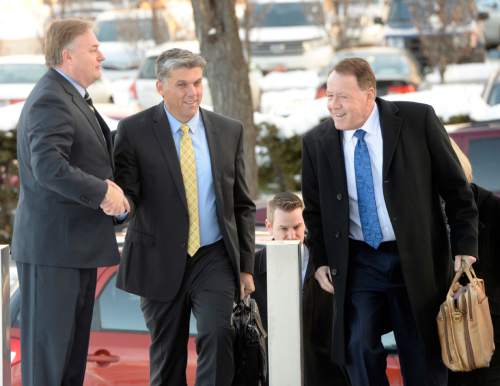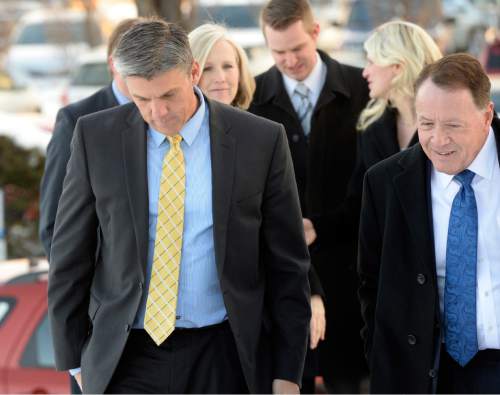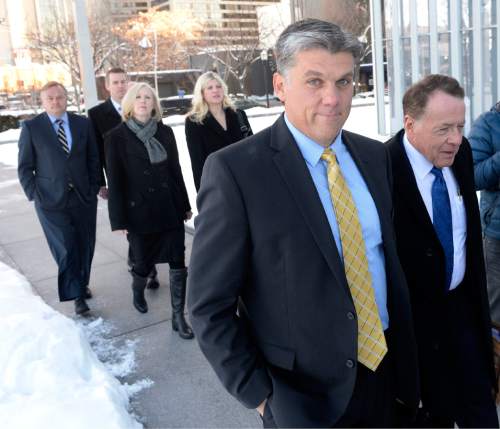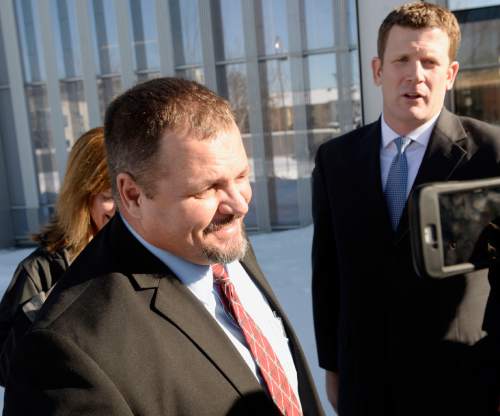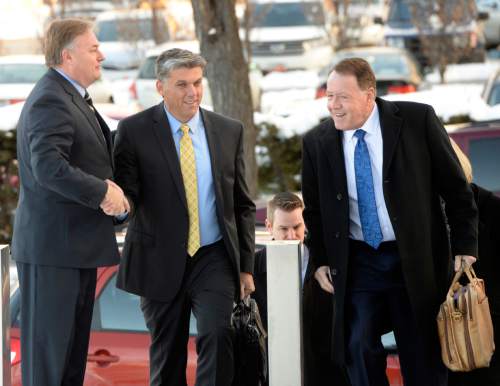This is an archived article that was published on sltrib.com in 2015, and information in the article may be outdated. It is provided only for personal research purposes and may not be reprinted.
A federal judge on Friday sentenced Phil Lyman to 10 days in jail and three years of probation for his role in an ATV protest ride down San Juan County's Recapture Canyon, putting to rest one of Utah's most politicized criminal prosecutions.
The misdemeanor case has sharply divided public opinion, already wedged over Utah's public-lands-transfer debate, in the months since jurors found the San Juan County commissioner guilty of trespass and conspiracy.
Lyman's crime was organizing, promoting and driving in an illegal protest last year in which 50 riders drove into the scenic canyon, east of Blanding, that federal land managers closed in 2007 to protect ancient American Indian sites.
"You took an oath to uphold the constitutions of the United States and Utah. We both have taken the same oath. We have to be extremely careful about things we say, things we do and the messages we put out," U.S. District Judge David Nuffer told Lyman in his Salt Lake City courtroom, which was packed with well-wishers and sympathetic county commissioners and sheriffs. Also present were Republican state lawmakers Mike Noel and Ken Ivory, the two leading advocates for the state takeover of public lands.
Lyman entered the courthouse with Mike Mower, Gov. Gary Herbert's deputy chief of staff; Herbert's office later confirmed without elaborating that Mower was there as a representative of the governor.
Nuffer ordered co-defendant Monte Wells to five days in jail and three years of probation. Lawyers for both men had asked for probation only, arguing that a $96,000 restitution order imposed earlier and probation terms would be sufficient punishment for men who contribute greatly to their communities and families and now regret breaking the law.
Lyman and Wells, both 51, are fathers of five and six, respectively, with younger kids at home and older ones serving church missions.
Sentencing guidelines called for terms ranging from no jail to six months, yet Nuffer struggled with what length to impose. Too much jail time would inflame those favoring greater local control over public lands, while too little would inflame those who support stronger conservation measures.
He agreed with prosecutors that jail is warranted and chose terms he figured would anger both sides of the public lands divide.
"This was a highly publicized, well-organized action. It caused considerable disruption and damage," Nuffer said. The short jail terms are in order because "that will strike a balance and I believe it's merited to promote respect of the law and deter similar conduct."
After passing his sentences, Nuffer called the circumstances surrounding the case "a tragedy" and delivered a homily on the need for people to engage in respectful dialogue. He decried what he sees as a "mythology" developing around the Recapture case, reflected in ill-informed letters of support filed on Lyman's behalf.
"I see distrust, hostility, anger, fear, hyperbole, people who refuse to acknowledge the validity of others' points of view. We have shared values, our country, our freedom, our land, but the way we go about this is destructive. What good comes out of conflict with the huge losses that we are seeing today?" said Nuffer, who practiced law in southwestern Utah for 25 years, 10 as Kanab's city attorney.
"More important than politics are people. We are all people. Can we reduce conflict and hostility? Can we stop emulating the people we see on television and the national politicians? ... If we don't ratchet down the emotion and negative qualities, we will do serious damage. This is a great time of year to examine ourselves and make changes for the betterment of our community."
Wells and Lyman have 14 days to appeal. After the hearing, defense lawyers declined to say whether they would.
In the meantime, Nuffer is allowing the men to self-surrender at their convenience. Lyman, a Blanding accountant, may wait until after April's tax season to surrender. They can serve their terms in the nearest Utah jail contracted to hold federal inmates.
The men selected the Washington County Jail, called Purgatory.
In addition, Lyman was fined $1,000 and Wells $500. The men are expected to contribute $500 a month toward restitution. A standard probation term bars defendants from possessing firearms, but Nuffer modified it to require only that the men remove guns and ammunition from their homes when probation officers visit. Wells is a federally licensed gun dealer and a full ban on possession would pose a financial hardship, defense lawyer Nathan Crane said.
Lyman's probation bars him from advocating the violation of federal land-use laws.
"There were things I truly, truly wish I had done differently," Lyman told the judge.
In his ad-libbed address, Lyman described the trauma Blanding families experienced from the 2009 BLM raids on homes of suspected artifact traffickers. This event, which led to the suicide of a prominent physician, remains emblematic of locals' resentment toward federal land managers.
"Old men we love and respected, relatives of mine harshly treated, it was a hard thing," said Lyman, who was elected to the County Commission the year after those arrests. "A friend's daughter was strip-searched. ... As an elected official, I hear those concerns. I feel an obligation to make myself accessible, but also vulnerable."
Yet he took a conciliatory tone, professed loyalty to the federal government and expressed regret that a constituent — Wells — would be facing jail "because of some misguided direction from me."
"Throughout this whole thing, I have felt extremely sorry for the time and effort put in by all the parties. It has caused me pain to see the amount of resources devoted to this. That was not the hope," the soft-spoken Lyman said, choking back emotions during his address.
"Take your time," said Nuffer, who had earlier assured the defendants that their statements would not be used against them.
Conspicuously absent from Lyman's plea for lenience was his supporters' oft-repeated claim that he was acting on behalf of his constituents.
The main thrust of defense lawyer Peter Stirba's argument Friday was that jail time would serve no useful purpose and could worsen relations between federal agencies and rural Utah.
"This is a misdemeanor, for crying out loud, a misdemeanor trespass case," Stirba said. "If this was a state case, probation would be required. Look at the life he has lived. He has lived an exemplary life."
An American flag, the attorney added, waves outside the home of this man, who reaches into his own pocket to support education in Utah's poorest county.
The restitution order and probation terms, which put serious restrictions on a citizen's liberty, would satisfy the needs of justice, he said.
But Assistant U.S. Attorney Jared Bennett noted that the "groundswell of support" Lyman has received, including donations from private and prominent public officials, means that "financial penalties become no penalty at all."
Though the jail terms and fines were far less than what were envisioned in the government's court filings, U.S. Attorney John Huber said he was pleased justice was served and praised the measured reasoning Nuffer put into the case, which the judge inherited from Judge Robert Shelby.
Lyman willfully broke federal law, a choice that if left unchallenged can lead to social chaos, Huber told a gathering of reporters at his office.
"The meaning of this case centers on rule of law. Our liberty is grounded in the law. The law provides a safe harbor for all our opinions. In our civilized society, we need to stay within the bounds of the law as we express those beliefs and philosophies, no matter how strongly held they may be," Huber said. "Mr. Lyman's conscious and deliberate disobedience of the rule of law runs contrary to the founding principles of our nation and the historical legacy of our state."
Huber said he hopes others who are inclined to break laws to vent their unhappiness with land-use decisions "will look at the sentence ... and have a second thought before walking down the slippery slope toward disorder, confusion and chaos."
The U.S. attorney highlighted Wells' courtroom remarks as a sign that Utah's dysfunctional public lands debate might improve.
"Protest and dissent are an important check and balance in our ordered society," Wells told the judge. "This country has always been important to me. That's why I went into military right out of high school."
A former lawman, he said he failed to appreciate the consequences of the protest, which turned out to be devastating.
"I have put my family through a continuing nightmare, placing my liberty and their security at risk," Wells said. "I have come to learn through painful experience the right to protest as with all other rights, exists largely because it's not absolute, meaning that with rights come responsibilities. I don't have the right to take away the rights of others."
Brian Maffly covers public lands for The Salt Lake Tribune. Maffly can be reached at bmaffly@sltrib.com or 801-257-8713
Twitter: @brian_maffly
Tribune reporter Tom Harvey contributed to this story.


